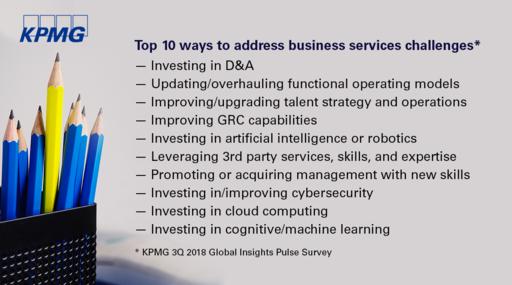Cost-Cutting Remains a Big Challenge, but Finance Execs See Digital Transformation as Top Obstacle: KPMG Survey
Top 10 Business Challenges Identified
Cloud, D&A, Talent Management, RPA Key ‘Enablers’ vs. These Challenges
Driving down operating costs ranks as the top business challenge in a global executive survey from KPMG, but leaders overseeing the numbers view a bigger challenge – enabling digital transformation.
According to KPMG’s 3Q 2018 Global Insights Pulse survey of 1,000 executives worldwide, finance and accounting decision-makers see a challenge in understanding, investing in and exploiting new technologies that enable digital transformation. These include intelligent automation, data and analytics, blockchain and the Internet of Things that are reshaping many business functions.
“Almost all organizations recognize the potential huge impact and benefit that intelligent automation (IA) technologies and their capabilities provide for improving process efficiencies and addressing talent and skills shortages – while further reducing costs and improving profits,” said Dave Brown, principal and leader of KPMG’s global and U.S. Shared Services and Outsourcing Advisory services practice. “However, the reality is that the pace and scope of execution is lagging the often overly optimistic expectations or desire on the part of the organizations.”

According to the research, the Top 10 business challenges are:
- Driving down operating costs – 31%
- Enabling digital transformation – 28% (Finance and Accounting executives ranked this highest)
- Increasing revenue and/or profits – 20%
- Dealing with talent shortages/talent management challenges – 12%
- Regulatory, compliance and tax burdens – 14%
- Political/government gridlock – 7%
- Competitive pressures – 9%
- Cybersecurity risks, corporate espionage and IP Theft – 7%
- Weakening consumer/customer demand – 3%
- Expanding into new geographic markets – 1%
The survey also notes that redesigning so-called “target operating models” (desired operating states); talent pools and talent management strategies; and improving governance, risk and compliance capabilities remain the tops ways to deal with the challenges cited above.In addition to how best to enable digital transformation, the perennial existence of legacy systems and the wide number of available technology solutions remain the top technological challenges to organizations.The survey found that the following approaches could help deal with or solve some of the challenges.
- Investing in data & analytics
- Updating and overhauling “target operating models”
- Improving/upgrading talent management and upgrading talent pools and talent management strategies
- Improving “Governance Regulatory and Compliance” (GRC)
- Investing in intelligent automation (IA) and Robotic process automation (RPA)
“Increasing functional efficiency and reducing operating costs as well as shifting functional focus to more value-added and strategic activities are ways to address the business challenges and opportunities driving most organizations,” said Anshul Varma, KPMG U.S. Advisory managing director. “Top challenges to these efforts include executing Target Operating Model changes, while still meeting daily business needs and obligations and defining the future-state of the organization.”
In addition, companies will need to upgrade their talent pools with the skills and capabilities to carry out these efforts, and become more strategic rather than simply transactional in their approaches to businesses process, the survey report noted.
Pulse Surveys are KPMG’s quarterly look at Global Business Services (GBS) and intelligent automation related market trends. To view the full survey results, click here. Follow the conversation at #globalinsightspulse @KPMG_US @KPMGUS_News.
Methodology
The survey was conducted among more than 1,000 KPMG professionals in 154 countries and sought to identify to the latest trends and technology developments of Global Business Services (GBS), Intelligent Automation and the service delivery market. It includes observations by professionals in the firm’s Sourcing Advisory Services, Financial Management, Technology, Human Resources, Customer & Operations and other practice areas.
KPMG regularly conducts global surveys to identify and interpret key market conditions, trends, and leading practices in how organizations use shared services, outsourcing, and third-party business and IT services.
About KPMG LLP
KPMG is one of the world’s leading professional services firms, providing business solutions and audit, tax, and advisory services to many of the world’s largest and most prestigious organizations. KPMG LLP is the independent U.S. member firm of KPMG International Cooperative (“KPMG International”). KPMG International’s independent member firms have 197,000 professionals working in 154 countries. Learn more at www.kpmg.com/us.










